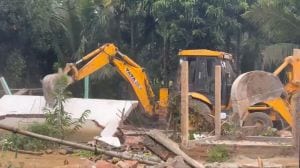At Arunachal event, PM Modi slams Congress: ‘Thought there were only two Lok Sabha seats, so why pay attention’
In Arunachal, Modi lays the foundation stone of two major hydropower projects. Northeast has 'become the centre of developmental activities”, he says.
 Speaking at the event, he stated that the Centre’s focus is on making the northeast “the driving force of the nation’s progress”. (PTI Photo)
Speaking at the event, he stated that the Centre’s focus is on making the northeast “the driving force of the nation’s progress”. (PTI Photo)Prime Minister Narendra Modi Monday visited Arunachal Pradesh, where he laid the foundation stones of two new major hydropower projects, among other infrastructure projects. He also claimed that the northeast has “become the centre of developmental activities”, and accused the Congress of “causing a lot of harm to Arunachal”.
Before the inauguration function, he interacted with traders and merchants in Itanagar, which the government said was to discuss the roll-out of the GST reforms. In a following event in Itanagar, he laid the foundation stones of Heo Hydro Electric Project (240 MW) and Tato-I Hydro Electric Project (186 MW) to be developed in the state’s Siyom sub-basin.
He also laid the foundation stone of a state-of-the-art convention centre at Tawang. According to a government statement, he also launched multiple infrastructure projects worth over Rs 1,290 crore across sectors such as connectivity, health, fire safety, and working women hostels.
Speaking at the event, he stated that the Centre’s focus is on making the northeast “the driving force of the nation’s progress”.
Alleging neglect under Congress government, he said: “The sun’s rays touch Arunachal Pradesh first but unfortunately, it took several decades for quick progress to reach here”.
He further said: “Nature has given so much to Arunachal, this land, the hardworking people, the ability. There is so much here but the people who used to run the country sitting in Delhi then had always looked away from Arunachal. Parties like Congress thought that there are such few people in Arunachal, there are only two Lok Sabha seats. So why should attention be paid to Arunachal?”
“Congress’s perspective caused a lot of harm to Arunachal, to all of the Northeast… When in 2014 you gave me the opportunity to serve the country, I resolved to free the country from Congress’s perspective. Our thoughts in this region are not guided by votes and the number of seats, but by the idea of ‘nation first.’ We have only one matra-nagrik devo bhava.”
Claiming that the northeast has become “a centre of developmental priorities”, he said: “We have increased the budget for the region by many times. We have made last mile connectivity and delivery the identity of the government. And not just this, we have decided that the government will not run sitting in Delhi.”
“Officers and ministers will have to come to the northeast… under the BJP government, central ministers have come to the northeast more than 800 times so far… I myself have come more than 70 times. Just last week I went to Mizoram, Manipur and Assam and stayed the night at Guwahati. I am fond of the Northeast from my heart. Because of this, we have removed the distance of the heart and brought Delhi close to you.”
Speaking about the two hydro-power projects for which he laid foundation stones Monday, he said that it would strengthen Arunachal’s position as a power producer and create jobs.
“It is an old habit of the Congress that whatever developmental work was difficult, they would never even touch it. This has harmed the Northeast and Arunachal. The difficult areas, in hills and jungles, they would declare those areas backward and forget about them. The Congress would wash their hands off the country’s tribal areas, the Northeast’s districts, villages near the borders, and hide their lack of work.”
This, he said, is the reason that people continuously left border areas and tribal areas.
“Our government also changed this approach. What the Congress called backward districts, we have made aspirational districts. The border villages that they called last villages, we have considered them first villages. Today in border villages, a new pace of development is being seen. The success of the Vibrant Village programme has eased people’s lives,” he said.
During the gathering, he also claimed that the BJP government has been “consistently reducing” taxes for the country.
“In the past few years, there have been many challenges before the country but we went on decreasing income tax. 11 years also ago, even people who earned Rs 2 lakh in a year had to pay income tax. This year we made annual income up till 12 lakh zero income tax. And today, we have capped the GST to two slabs. 5 percent and 18 percent. Many items have become tax free and taxes on other goods have reduced significantly. Building a home, purchasing a scooter or bike, dining out, and travelling have all become more affordable,” he said.







